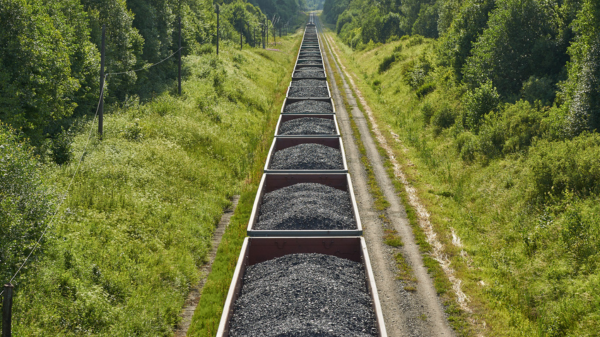By Nolan McKendry
(The Center Square) − The United States saw an 8% decrease in coal transportation in 2023, according to the Energy Information Administration, continuing a long-term trend of diminishing coal shipments.
The coal industry’s share in electricity generation has been struggling for years as liquified natural gas and renewables have come to dominate the market. Coal transports to power plants have fallen by more than half since 2010, from 957 million tons to 422 million, according to the Energy Information Administration.
Though the industry has seen a steady decline, coal still constitutes about 20% of electricity generation in the U.S.
“No other industry or business is impacted by public policy quite as much as coal is,” Chris Hamilton, President and CEO of the West Virginia Coal Association, told The Center Square. “The future of coal hinges in large measure on the election in 2024.”
Currently, the Environmental Protection Agency enforces a torrent of regulations and rules on coal-fired power plants.
“If fully implemented, these rules could lead to the closure of most of the country’s coal plants…before 2040,” the World Resource Institute wrote in May.
In his first term, President Donald Trump scaled back many environmental regulations, which he claimed were hindering coal’s future, such as repealing the Obama administration’s moratorium on coal leasing. The moratorium ended up being reinstated in 2022, only to be struck down again in February 2024.
Hamilton says that the newer coal plants produce far fewer pollutants.
A 2020 study from the National Energy Technology Laboratory showed that a plant with pollution controls can reduce nitrogen oxides by 83 percent, sulfur dioxide by 98 percent, and particulate matter by 99.8 percent compared to plants without such controls.
“The amount of CO2 produced by these coal-fired plants is minuscule compared to automobiles alone, for instance,” said Hamilton. “We stand behind the importance of these plants to our nation’s economy, our grid, and our whole power sector.”
Trump’s promise to revive coal hinged on an assumption that a repeal of the burdensome regulations imposed during the Obama administration would help stabilize the industry.
But more important to fleeing coal jobs and closing plants was the shift toward cheaper and cleaner sources of energy, in particular liquified natural gas, which has exploded in recent years.
Currently, Trump’s campaign site says that he will provide relief to the coal, oil, and gas industry, which are “suffocating” under the Biden administration’s tax hikes.
From 2016 to 2020, LNG exports increased from 186 billion cubic feet to 2,389 billion cubic feet.
“Coal, unlike natural gas and liquified natural gas, provides baseload generation, which can be utilized on demand, 24/7, under the most severe inclement weather, for instance,” Hamilton said.
Coal is advantageous as a baseload power source due to its reliability, high capacity, and cost-effectiveness. Its ability to be stored and used as needed, coupled with established infrastructure and significant domestic reserves, enhances energy security and ensures a continuous power supply.
“The current administration is using every possible resource to impact fossil energy and curtail production, possibly even eliminate fossil energy from our economy,” Hamilton said. “We’re going to have to ramp up our overall power generation in the near future, and that can’t be done without leveraging our coal capacity.”
While Hamilton recognizes that the transition to renewable energy has left the coal industry in a vulnerable place, he also recognizes how important air quality is, and acknowledges the coal industry’s responsibility in managing their pollutants.
“It darkens in Downtown Shanghai today at 4:30 PM because of the length of aftertreatment devices on these facilities,” he said.
Hamilton mentions the major role coal continues to play in providing Americans with electricity.
“We think that coal should be given the same credence as our renewable energy forms,” he said.
Nolan McKendry is an intern reporter for The Center Square.
Originally published by The Center Square. Republished with permission.


























